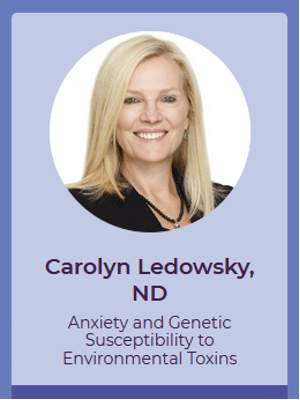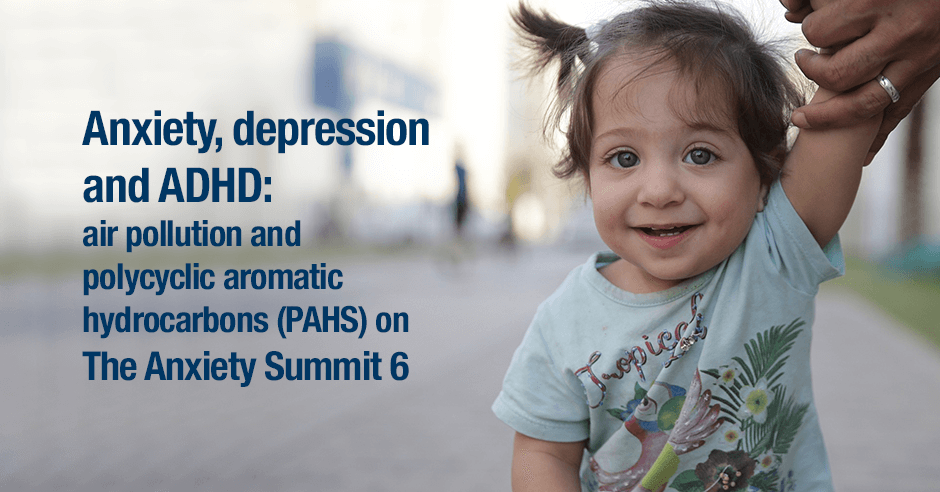Dr. Carolyn Ledowsky is one of my guest experts on The Anxiety Summit 6: Toxins/Meds/Infections
and our topic is Anxiety and Genetic Susceptibility to Environmental Toxins. Here is some of what we cover in our interview:
- Polycyclic aromatic hydrocarbons/PAHs (air pollution/smoke) and organophosphates
- Moth balls, candles, xenobiotics, coffee, make-up, perfume and cosmetics
- Role of CYP1A1, CYP2B, CYP1B1, SOD, GSTM and PON1 polymorphisms

We discuss very common sources of pollution – polycyclic aromatic hydrocarbons (PAHs) – and how certain gene polymorphisms can make us more susceptible leading to increased anxiety, depression and cognitive issues.
If you’re new to the term polycyclic aromatic hydrocarbons (PAHs), according to the EPA they “are a class of chemicals that occur naturally in coal, crude oil, and gasoline. They also are produced when coal, oil, gas, wood, garbage, and tobacco are burned.”
This essentially means that PAHs are all around us: traffic pollution, forest fires, wood burning in your home, coal burning power plants, cigarette smoke, second hand smoke, dust and more!
We discuss one study that reports how prenatal exposure to pollution can impact the ability of children when it comes to learning and make them more anxious and depressed:
- Children of nonsmoking African-American and Dominican women in New York City were followed from in utero to 6–7 years.
- The paper mentions urban air pollutants from fossil fuel burning and other combustion sources stating the results suggest an adverse impact of prenatal PAH exposure on child behavior that could impact cognitive development and ability to learn.
- Anxiety, depression, and attention problems, which were associated with PAH exposure have been shown to affect subsequent academic performance.
- The authors conclude that prenatal exposure to environmental PAH at levels encountered in the air of New York City may influence child behavior.
There are other similar studies reporting these issues in other age groups and other communities too, supporting the fact that PAHs/air pollution is more than a respiratory issue.
It contributes directly to mental health problems – anxiety, depression and ADHD – and needs to be considered as part of the solution.
—>> Find your anxiety solutions when you attend this complimentary, online event!!
We go deep into other sources of toxins and pollutants. And then look at the CYP enzymes (needed to process PAHs), and PON1 (needed to process organophosphates/pesticides) and what it means when we have polymorphisms i.e. a genetic susceptibility and what to do.
This interview is one of the registration gifts so you can listen to it right away as soon as you register (there will also be a complimentary transcript made available as soon as it’s completed.)
Here is a little about the summit… as you know, anxiety can be related to your daily life experiences BUT it can also be triggered by:
- foods you eat and what you drink (like wheat, oxalates, alcohol and more)
- environmental toxins (like lead, plastics, fragrances, insecticides, fluoride and more)
- many types of medications (like the birth control pill, acne medication, fluoroquinolone antibiotics and more) and/or
- chronic infections (like Lyme disease, PANDAS, parasites, candida and more).
Once you identify the root causes and understand anxiety’s mechanisms you can support the liver/gallbladder, detox, address infections, implement targeted and supportive solutions, and get relief!
WHY ATTEND?
This is my 6th Anxiety Summit, featuring all new topics and the latest research related to anxiety and toxins, medications and infections.
I’ve also experienced many of these health challenges myself – lead and mercury toxicity, gluten issues and candida – and I’m currently dealing with chronic Lyme disease and dietary oxalate issues. You’ll hear some of my healing journey and my solutions in a few interviews too.
WHAT SETS THIS ONLINE EVENT APART?
What sets this apart from other events on toxins and infections is being able to make the many connections to GABA (the main calming neurotransmitter) and serotonin (a happy and calming neurotransmitter) AND how to use the amino acids GABA and tryptophan to ease your anxiety right away while you are dealing with the other underlying root causes – which take longer to address.
You will see this woven into each of the expert interviews (just like this one with Dr. Schaffner) and also addressed in detail in my 3 interviews where I do a deep dive into specific applications.
For example, in my toxins interview, I share how GABA reverses fluoride-induced anxiety and hypothyroidism, and how tryptophan and vitamin C ease anxiety symptoms associated with lead toxicity (I’ll be sharing more about this in the future so stay tuned….)
Over the course of the next 6 weeks you’ll be seeing frequent emails from me with snippets and highlights from various interviews – like this one. I do hope you continue to enjoy them and get excited about the summit! Please do share if you know someone who has anxiety!
You’ve heard me say the Anxiety Summit has been called “a bouquet of hope!” My wish for you is that this summit is your bouquet of hope!
I hope you’ll join me and these incredible speakers, be enlightened and find YOUR solutions!
Here’s to no more anxiety and you feeling on top of the world again!
If you’re already familiar with some of this information and practice some of this already please share how it’s helped you. That way we can all learn.
If you’d like to ask a question, please post in the comments below.
I’d also love to hear from you once you’ve listened to this interview. Please do come back and comment about some of the highlights of this interview and what changes you plan to make.



Leave a Reply